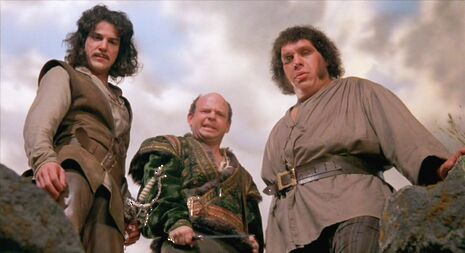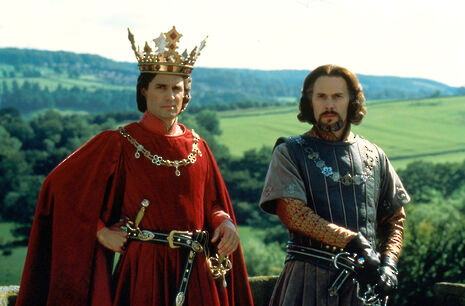‘Inconceivable!’ Celebrating The Princess Bride at 30
Through her own personal memories, Lillian Crawford attempts to understand what has kept families returning to a beloved fantasy classic for thirty years.

It was a cold and rainy morning, and I had the most dreadful cold an eight-year-old can know. Having bound myself tightly to the sofa under my duvet, I sipped hot lemon and honey as my mother put a VHS tape in the recorder and, once the film had been rewound (of course), pressed play. I owe my mother credit for much of my early film watching experiences, many of which have developed into full-blown autograph-grabbing obsessions, from the plains of Middle Earth to galaxies far, far away. This was, as it turned out, a very different sort of adventure to the ones we had been on together previously, one of fencing, revenge, true love, and miracle-making. Like the grandson at the opening, I had no idea of what lay in store.
"Maybe the film's appeal is just how unafraid it is to present the harsh realities beneath its sugary surface."
Yesterday, feeling the angst of essays and the looming return to Cambridge, my mother and I watched The Princess Bride again, swapping out the now-exhausted VHS for the glorious Special Edition. Still, while undoubtedly making for a cleaner watch, there is a bittersweet nostalgia to the grains and lines of a much-loved home video that should never be forgotten. The occasion also happened to be the thirtieth anniversary of the film’s release in 1987, and yet it felt as though I was watching it for the very first time.
It can often be startling to re-watch childhood favourites as an adult, and what normally strikes one first is the humour. I recently felt a similar experience blowing the cobwebs off my James Bond collection, finding myself both aghast and in stitches at the biting comedy (“You always were a cunning linguist, James.”) that simply danced over my head in younger days. Where previously the epic romance of Westley and Buttercup, alongside daring duels and Rodents Of Unusual Size, held my gaze, today it seems that the Man in Black could give the rapid-tongued spy himself a run for his money (“There’s a shortage of perfect breasts in this world. It would be a pity to damage yours.”)

Likewise, the hilarity of its performances is more evident now than ever, from the late Mel Smith’s wheezy Albino, to the incompetent bishop played by Peter Cook (“Mawage. Mawage is wot bwings us togeder tooday.”) Perhaps the finest of them all is Miracle Max, who had previously only sounded to me like a certain green cycloptic monster. Billy Crystal’s performance remains a firm fan favourite years later, quite literally chocolate-coating the dire situation at hand (“Have fun stormin’ da castle.”), having just witnessed a quite incongruous torture scene in one the greatest family films ever made.
"It seems only the laughably-retro synth score has failed to age well."
Indeed, maybe the appeal of The Princess Bride is just how unafraid it is to present the harsh realities beneath its sugary surface. After all, children’s writers have been doing it for centuries; one need only look at such stories as ‘The Girl With No Hands’ to see the lack of restraint of the Brothers Grimm, and the notoriety of Walt Disney’s treatment of mothers. Perhaps this goes some way to explaining the film’s PG age-rating, refusing profusely to give children what they come to desire for its protagonists, as displayed by the sick grandson. While far from overtly moralistic, the universal, notably ‘adult’ themes raise it above much of the fancifully PC garbage animation studios churn out today.
One of the most touching and earnest scenes is Inigo Montoya’s gruelling revenge on the dreaded Six-Fingered Man, spared the seemingly merciful fate of his obvious secret lover, Prince Humperdinck. Mandy Patinkin himself lost his father shortly before the film’s production, and the rage he injects into his famous avenger’s speech is nothing short of striking. Christopher Guest appears literally and emotionally disarmed as he falls to ground in a pool of blood, ending a scene stirringly mirrored by Julie Waters as she kills Bellatrix Lestrange in the final Harry Potter film (“I want my father back, you son of a bitch!”) Its cinematic and storytelling influence remains stronger now than ever.
I could reminisce over the film’s finest scenes and dialogue for hours, but much like Wallace Shawn’s incompetent Vizzini, my time is short. Returning to the film today I had feared it might have met a similar fate to the dated dullness of Willow, but instead it seems only the laughably-retro synth score has failed to age well. Naturally, it would not do to make comparisons to the grander works of the fantasy genre, for this is no Lord of the Rings, but then it never tried to be. Like William Goldman’s novel before it, Rob Reiner crafted a film specifically for those days when children have a cold or are just down in the dumps. A mother’s cuddle and some tales of the inconceivable are often all they need to feel better, even when they are all grown-up
 News / Cambridge academics sign open letter criticising research funding changes22 February 2026
News / Cambridge academics sign open letter criticising research funding changes22 February 2026 News / Supporters protest potential vet school closure22 February 2026
News / Supporters protest potential vet school closure22 February 2026 News / University Council rescinds University Centre membership20 February 2026
News / University Council rescinds University Centre membership20 February 2026 News / Hundreds of Cambridge academics demand vote on fate of vet course20 February 2026
News / Hundreds of Cambridge academics demand vote on fate of vet course20 February 2026 Comment / A tongue-in-cheek petition for gowned exams at Cambridge 21 February 2026
Comment / A tongue-in-cheek petition for gowned exams at Cambridge 21 February 2026








